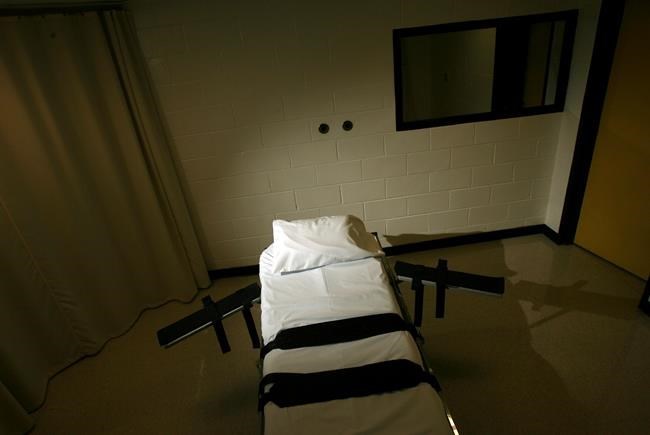
FILE - The gurney used for lethal injections sits in a small cinder block building at the Georgia Diagnostic and Classification Prison in Jackson, Sept. 7, 2007. (Ben Gray/Atlanta Journal-Constitution via AP, File)
February 14, 2025 - 9:32 AM
ATLANTA (AP) — A federal judge has ruled against a man on Georgia’s death row who argued that lethal injection could cause him excruciating pain and suggested a firing squad as an alternative.
Michael Wade Nance argued that because of his medical history an injection of the sedative pentobarbital, the only execution method authorized in the state, could cause him severe pain in violation of his constitutional rights. U.S. District Judge J.P. Boulee ruled Thursday that Nance had failed to prove that and, as a result, Boulee didn't weigh in on whether a firing squad is a feasible alternative.
Anna Arceneaux, a lawyer for Nance, on Friday declined to comment on the ruling but said they plan to appeal. The case was originally filed in January 2020 and has already been up to the U.S. Supreme Court once before.
Nance, 63, was convicted and sentenced to death for killing Gabor Balogh in 1993. Nance had just robbed a Gwinnett County bank and abandoned his own car after dye packs hidden in the stolen money exploded. Balogh was backing out of a parking space at a liquor store across the street when Nance pulled open the car door and shot him, according to court filings.
Nance's lawyers argued that his veins are tough to find by sight and that those that can be seen are compromised. There is a substantial risk that his veins could “blow” during an execution, causing the drug to leak into surrounding tissue and cause intense pain, they wrote.
His lawyers also argued that Nance's longtime use of a medication for back pain could make the pentobarbital used in lethal injections ineffective or less effective.
Boulee noted that a doctor who testified for the state during a bench trial in May indicated that since Nance's suit had been filed he had undergone three separate medical procedures that required an IV to be placed and that there had been no problems.
On the issue of whether his longtime use of a pain medication could interfere with the execution drug, Boulee cited the testimony of a doctor called by Nance's lawyers who said “no one actually knows" what the effect would be.
The U.S. Supreme Court has said that to challenge an execution method under the Eighth Amendment, a person must show that the method creates “a substantial risk of serious harm” and that there are “known and available alternatives” that are “feasible, readily implemented" and that will significantly reduce the risk of severe pain.
That is why Nance's lawyers had raised the possibility of the firing squad.
The lawsuit was initially filed in January 2020, and Boulee ruled in March of that year that Nance's arguments were procedurally barred because he’d waited too long to make them and that he had failed to show his constitutional protections against cruel and unusual punishment would be violated.
Nance appealed and a panel of the 11th U.S. Circuit Court of Appeals concluded that since lethal injection is the only method of execution authorized by Georgia law, Nance was effectively challenging the validity of his death sentence. The panel said Nance was procedurally barred from bringing that type of challenge.
Nance appealed to the U.S. Supreme Court, which overturned the 11th Circuit ruling. Justice Elena Kagan wrote in the majority opinion that in challenging Georgia's execution method he was “not confined to proposing a method authorized by the executing State's law.” There is no reason to believe that amending state law to allow executions by firing squad would be a “substantial impediment” to carrying out the death sentence, she wrote.
That is how the case landed back before Boulee, who held a bench trial in May during which he heard testimony that execution by firing squad would result in a quick death. But because Nance failed to show that his medical conditions would cause him to suffer severe pain during a lethal injection, the judge said he had “no need to address” the firing squad argument.
News from © The Associated Press, 2025